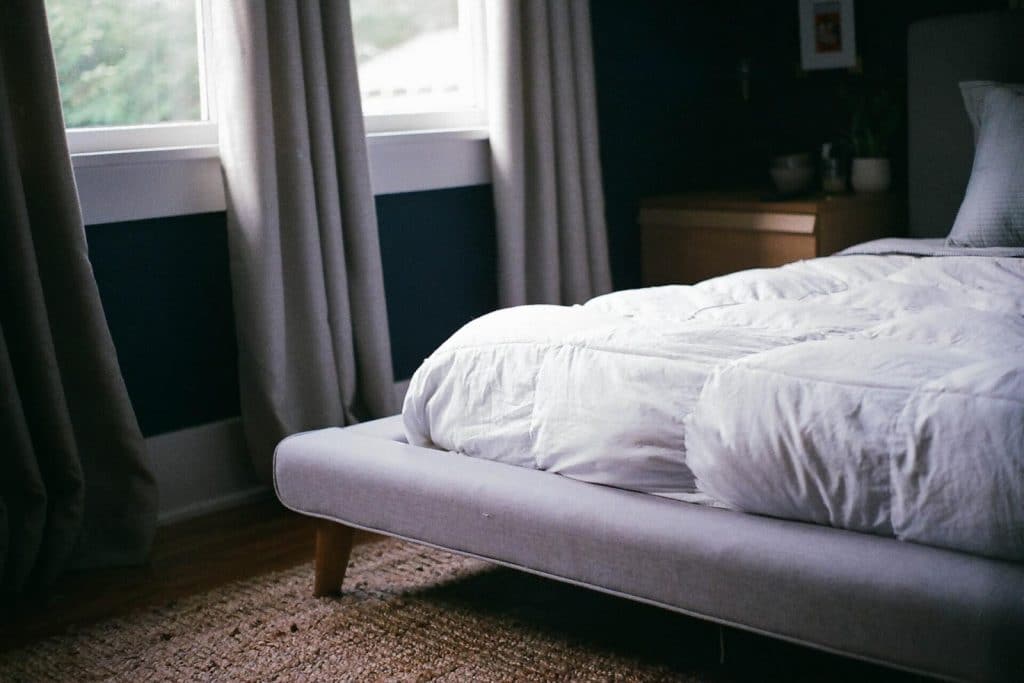If you have bought a new bed or mattress and find it difficult to fall asleep on it, it might be firmer than it should be. Not only can it make you sleep deprived but it can also lead to muscle and joint pains.
You’ll find it difficult to sink into your bed, experience back pains and stiff joints after waking up, and might even suffer from sleeplessness if your mattress or bed is too firm.
In this article, we’ll discuss the most common symptoms indicating that your bed is too firm. We’ll also discuss some tips that will help you fix this problem.
Why Is My Bed Too Firm?

The following are the most common reasons why your bed is too firm.
- If you have a new mattress or bed, you might find it too firm because of its stiff foam layers. It’ll take some time, also known as the break-in period, to soften and loosen up mattress materials.
- Temperature-sensitive memory foam mattresses or beds can become too firm at a cooler temperature. You’ll need to increase your room’s temperature by a degree or two to make your mattress softer.
- Buying a poor-quality bed can also be a reason why it feels too firm. While it’ll save you a few bucks, it’ll lead to several physical problems such as aching muscles and joints.
- Using the wrong foundation for your mattress can make it overly firm. For example, your coiled spring mattress will have an undesirable firmness level if you use a wooden slat frame as a foundation. Ideally, you should use a box spring for a coiled spring mattress.
How Do You Know If Your Bed Is Too Firm
Here’s a list of the signs that indicate that you’re sleeping on a too firm mattress.
Back Pain

You have an overly firm mattress if you wake up with back pain. In such a case your back will feel extremely worn out and strained. It’s important to note that in the past, doctors used to recommend people sleep on very firm mattresses to deal with back pains.
However, the latest research published in Harvard Health Publishing suggests that sleeping on hard beds affects your sleep quality negatively. So, if you’ve started feeling back pains after buying a new mattress or your pre-existing back pain condition has gotten worse, you have a firmer mattress than required.
When your mattress is too firm, you’ll also feel pain in your joints and muscles right after waking up. If you’re a side sleeper you’ll wake up with stiff shoulders and knees. Additionally, you’ll also experience pain and stiffness in your neck.
Read also: Does a memory foam mattress cause back pain?
Extremely Low Sink-in Rate
Most new beds have a low sink-in rate but it increases with time as mattress materials soften and loosen up. However, if your bed or mattress still has a poor sink-in rate even after its break-in period, it’s firmer than required.
Tossing and Turning Constantly

If you find yourself tossing and turning constantly in your bed and find it difficult to fall asleep, you have an overly firm bed. It happens because of the extremely low sink-in rate that keeps your body from settling in and getting adjusted to the bed’s hard surface.
Not only will it keep you uncomfortable but it will also lead to disturbed sleep patterns. You’ll need to wake up multiple times during the night, even if you’re a heavy or sound sleeper. You’ll also feel tingling and numbness in your hands and arms.
Read also: Why you shouldn’t sleep in the freefaller position
Sleeplessness
As mentioned above, a firmer mattress can lead to back and neck pains. According to studies, there’s a strong connection between back and neck pains and insomnia.
While it’s normal to find it difficult to fall asleep on a new mattress for some days, this problem should go away after the mattress break-in period. However, if the problem persists, you need a softer mattress.
How Do You Fix A Bed That’s Too Firm?

If you have a firmer mattress than required, consider using the tips listed below to decrease its firmness.
Use a Mattress Pad
Using a memory foam mattress topper or a mattress pad is one of the most effective ways to deal with a firmer mattress. This method comes in handy when you can’t return or get your firm mattress exchanged.
Choose a thick mattress pad that comes with high-quality memory foam. It’ll add a pillowy layer to your mattress that’ll help you sleep comfortably.
Flip and Rotate

Flipping and rotating your mattress will allow it to soften and loosen up its materials evenly. While it’ll take some time to achieve the desired softness level, the mattress will stay comfortable for a longer period.
Add Weight
You can also add some weight to your mattress to make it softer and accelerate the break-in process. You can also walk and crawl on your mattress and spend more time on it daily for the same purpose.
Read also: What are the benefits of sleeping on a firm mattress?
FAQs
Is It Better to Sleep on a Soft Mattress or Hard for Back Pain?
According to the National Library of Medicine, using a medium-firm mattress is the best option to get rid of back pains. You won’t be able to sleep comfortably if your mattress is too firm or soft. You’ll be tossing and turning around throughout the night and won’t be able to sleep in your preferred sleeping position.
What Happens If Mattress Is Too Firm?
You’ll experience back pains, stiffness in joints and muscles, and sleeplessness if your mattress is too firm. It’ll put a strain on your body’s pressure points, such as the torso, hips, and shoulders. In the worst cases, it can also lead to spinal misalignment.
Conclusion: How Do You Know If Your Bed Is Too Firm?
Other than causing joint and muscle pains, an overly-firm mattress can affect your quality of sleep. It’ll keep your body from recovering and you’ll wake up feeling tired and lethargic.
We hope this guide will help you understand how you know if your bed is too firm and how to fix it. If none of the tips listed above works to fix the mattress and it still feels overly firm after the break-in period, get it exchanged or returned.
